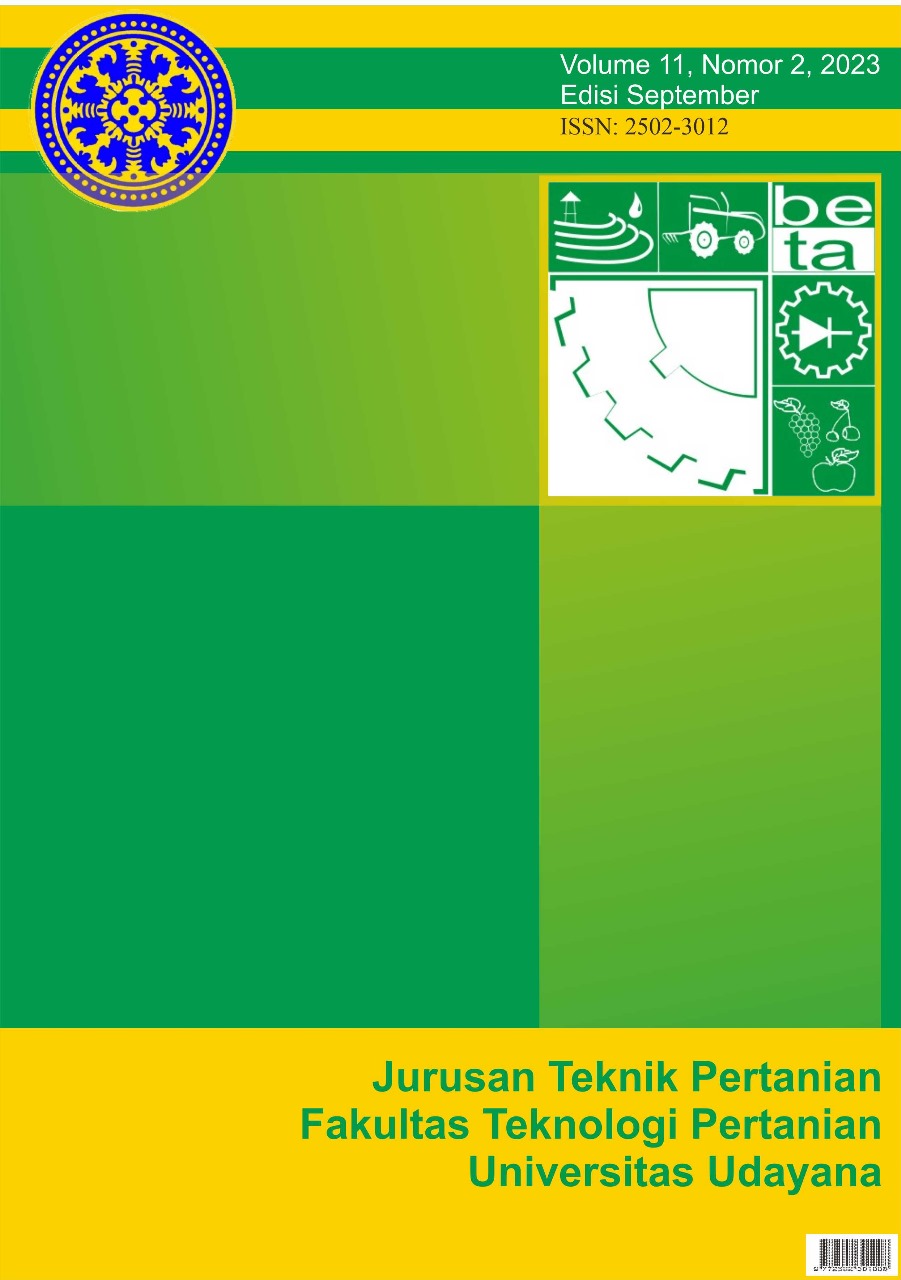Pengaruh Cara Mematikan dan Lama Waktu Post-Mortem terhadap Mutu Kesegaran Filet Ikan Mujair (Oreochromis mossambicus)
Abstract
Abstrak
Filet ikan mujair merupakan salah satu bahan pangan sumber protein yang sangat diperlukan untuk pemenuhan gizi. Mutu kesegaran ikan filet ditentukan oleh beberapa hal, antara lain kualitas bahan baku dan cara mematikan ikan yang digunakan. Tujuan dari penelitian ini adalah untuk mengetahui pengaruh cara mematikan dan lama waktu post-mortem terhadap mutu kesegaran filet ikan mujair (Oreochromis mossambicus). Penelitian ini menggunakan percobaan faktorial-RAL (rancangan acak lengkap) dengan 2 faktor, yaitu cara mematikan ikan dan lama waktu post-mortem. Cara mematikan ikan memiliki 3 taraf perlakuan, yaitu mati menggelepar, suhu dingin, dan teknik ikejime. Sedangkan, lama waktu post-mortem memiliki 8 taraf perlakuan, yaitu; 0, 2, 4, 6, 8, 10, 12, dan 14 jam. Perlakuan diulang sebanyak 2 kali, sehingga didapat 24 kombinasi perlakuan dan 48 sampel percobaan. Parameter yang diamati adalah indeks rigor, organoleptik mutu kesegaran ikan, pH, kadar protein, dan organoleptik mutu kesegaran filet. Data hasil pengamatan diolah dengan analisis sidik ragam (ANOVA), uji Duncan, dan uji Kruskal-Wallis. Hasil dari penelitian ini menunjukkan bahwa cara mematikan dan lama waktu post-mortem berpengaruh nyata terhadap beberapa parameter mutu kesegaran filet ikan mujair. Kombinasi perlakuan terbaik adalah mematikan dengan teknik ikejime dengan lama waktu post-mortem 0 jam dengan karakteristik pH sebesar 6,94, kadar protein sebesar 26,65% dan skor organoleptik daging ikan sebesar 8,80, serta skor tekstur daging ikan sebesar 8,95.
Abstract
Tilapia fish filet is one of the protein-rich foods needed by the body. The freshness quality of the tilapia fish filet is affected by the quality of the raw materials and the method of killing the fish. This study aimed to determine the effect of the lethal technique and the length of post-mortem time on the freshness of tilapia fish (Oreochromis mossambicus) filets. This study used a factorial-CRD trial (Completely Randomized Design) for two factors. The first factor is how to kill the fish (floating death, cold temperature, and ikejime technique). The second factor was the length of post-mortem time (0, 2, 4, 6, 8, 10, 12, and 14 hours). Each treatment was repeated by 2 times so that 48 samples were obtained from 24 treatment combinations. The observed parameters are the rigor index, organoleptic freshness, pH, and protein content. Observational data were processed by Analysis of Variance (ANOVA), Duncan test, and Kruskal-Wallis test. The results of this study indicate that the method of shutting down and the length of time post-mortem significantly affect several parameters of the freshness quality of tilapia fish fillets. The best combination of treatment is lethal with the ikejime technique with a post-mortem time of 0 hours which has a pH of 6.94, protein content of 26.65% and fish meat organoleptic score of 8.80, and fish meat texture score of 8.95.
Downloads
References
Borderías, A. J., & Sánchez-alonso, I. (2011). First Processing Steps and the Quality of Wild and Farmed Fish. Journal of Food Science, 76(1), 1–5.
Concollato, A., Olsen, R. E., Vargas, S. C., Bonelli, A., Cullere, M., & Parisi, G. (2016). Effects of stunning/slaughtering methods in rainbow trout (Oncorhynchus mykiss) from death until rigor mortis resolution. Aquaculture, 464, 74–79.
Daniel, H. (2016). Mikroorganisme penyebab kerusakan pada ikan dan hasil perikanan lainnya. Buletin Matric, 13(2), 17–21.
Duarte, A. M., Silva, F., Pinto, F. R., Barroso, S., & Gil, M. M. (2020). Quality assessment of chilled and frozen fish—Mini review. Foods, 9(12), 1–26.
Gatica, M. C., Monti, G. E., Knowles, T. G., & Gallo, C. B. (2010). Muscle pH, rigor mortis and blood variables in Atlantic salmon transported in two types of well-boat. Veterinary Record, 166(2), 45–50. https://doi.org/10.1136/vr.c71
Herawati, D. P., & Darmanto, Y. (2014). The Influence of Mortality Process and The Fish Freshness Reduction Phase of Carp (Cyprinus carpio) Paste Quality. Jurnal Pengolahan Dan Bioteknologi Hasil Perikanan, 3(3), 23–31.
Islami, S. N.-E., Reza, M. S., Mansur, M. A., Hossain, M. I., Shikha, F. H., & Kamal, M. (2014). Rigor index, fillet yield and proximate composition of cultured striped catfish (Pangasianodon hypophthalmus) for its suitability in processing industries in Bangladesh. Journal of Fisheries, 2(3), 157.
Lemae, & Lasmi, L. (2019). Studi pengaruh kemunduran mutu terhadap kandungan gizi Ikan Betok (Anabas testudineus) dari Daerah Mandor. Octopus, 8(1), 20–26.
Lestari, S., Baehaki, A., & Rahmatullah, I. M. (2020). Pengaruh Kondisi Post Mortem Ikan Patin (Pangasius Djambal) dengan Kematian Menggelepar yang Disimpan pada Suhu Berbeda Terhadap Mutu Filletnya. Jurnal FishtecH, 9(1), 34–44.
Liviawaty, E., & Afrianto, E. (2014). Penentuan Waktu Rigor Mortis Ikan Nila Merah (Oreochromis Niloticus) Berdasarkan Pola Perubahan Derajat Keasaman. Jurnal Akuatika Indonesia, 5(1), 244592.
Masengi, S., Winda Sary, & Hotmauli Sipahutar, Y. (2021). Pengaruh Cara Kematian dan Tahap Penurunan Mutu Filet Ikan Nila Merah (Oreochromis niloticus). Jurnal Pengolahan Hasil Perikanan Indonesia, 24(2), 284–291. https://doi.org/10.17844/jphpi.v24i2.32498
Nurilmala, M., Nurjanah, & Hardja Utama, R. (2009). Kemunduran Mutu Ikan Lele Dumbo (Clarias Gariepinus) Pada Penyimpanan Suhu Chilling Dengan Perlakuan Cara Mati, 1–16.
Robb, D. (2002). Seafoods — Quality, Technology and Nutraceutical Applications. In Seafoods — Quality, Technology and Nutraceutical Applications.
Siregar, R. A. (2020). Penilaian Organoleptik dan TVB Ikan Mas (Cyprinus carpio) dengan Cara Kematian yang Berbeda Selama Penyimpanan Suhu Ruang (Vol. 4, Issue 1) [Universitas Riau].
Sudarmadji, S., Haryono, B., & Suhardi. (1997). Prosedur Analisa untuk Bahan Makanan dan Pertanian (4th ed.). Liberty.
Suwetja, I. K. (2007). Biokimia Hasil Perikanan (3rd ed.). Universitas Ratulangi Manado.
Trisnawati, D. (2020). Kemunduran Mutu Ikan Gabus (Channa striata) dengan Teknik Mematikan Ikan yang Berbeda pada Suhu Ruang 28˚C [Universitas Riau]. In Konstruksi Pemberitaan Stigma Anti-China pada Kasus Covid-19 di Kompas.com (Vol. 68, Issue 1).
Wibowo, I. R., Darmanto, Y., & Anggo, A. D. (2014). Pengaruh Cara Kematian Dan Tahapan Penurunan Kesegaran Ikan Terhadap Kualitas Pasta Ikan Nila (Oreochromis Niloticus). Jurnal Pengolahan Dan Bioteknologi Hasil Perikanan, 3(3), 95–103.












 Jurnal BETA (Biosistem dan Teknik Pertanian)
Jurnal BETA (Biosistem dan Teknik Pertanian)


